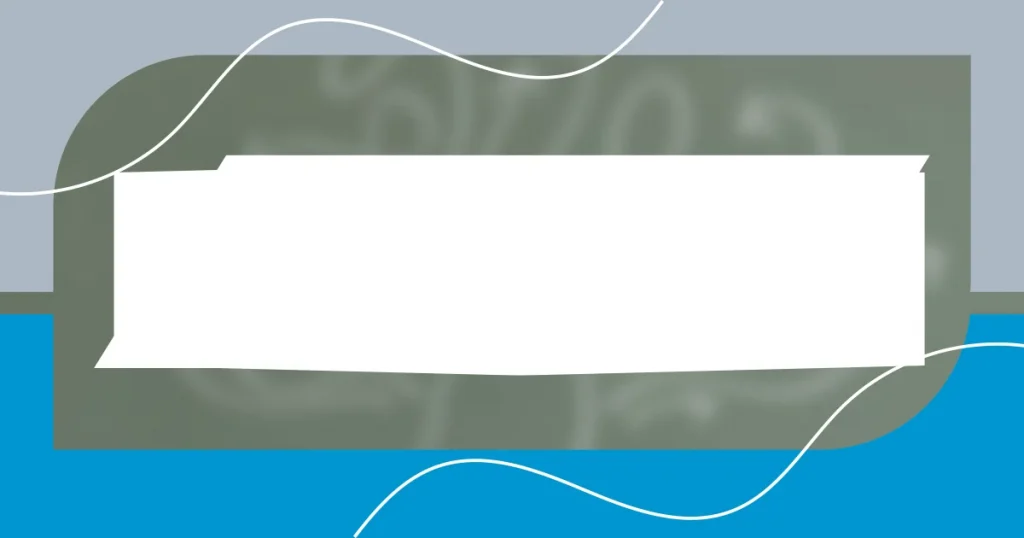Key takeaways:
- Life-changing novels evoke deep emotions and challenge perspectives, prompting self-reflection and personal growth.
- Key criteria for selecting impactful novels include emotional resonance, universal themes, character development, narrative style, and lasting impact.
- Books like *To Kill a Mockingbird*, *1984*, and *The Catcher in the Rye* explore themes of social justice, freedom, and authenticity, significantly influencing the reader’s values and worldview.

Introduction to life-changing novels
Life-changing novels have a way of tapping into our deepest emotions and challenging our perspectives, often shifting the trajectory of our lives. I can think back to the moment I put down a particular book—I felt as if the story had peeled back layers of my understanding and left me contemplating who I wanted to be. Have you ever closed a book and felt like you had seen a glimpse of a new world or a different version of yourself?
These novels often address complex themes that resonate with universal experiences, from love and loss to identity and resilience. I recall reading one story during a turbulent time in my life; its characters faced struggles eerily similar to my own. In that moment, I felt a connection that provided both comfort and clarity. Isn’t it fascinating how a single narrative can fill us with empathy and inspire change?
As I reflect on my own favorites, I realize these stories shaped my values and beliefs in ways I still appreciate today. Each novel acts as a mirror, reflecting aspects of our character while also urging us to evolve. What powerful insights have you gained from your own reading experiences?

Criteria for selecting novels
Choosing the right novels for a life-changing list isn’t simply about popularity or acclaim; it’s a deeply personal exercise. I often find myself reflecting on the emotional depth these stories evoke and how they resonate with my own life experiences. When I think about a novel that truly impacted me, it’s often because it prompted a profound shift in my perspective or helped me understand a challenging situation.
Here are a few key criteria I consider when selecting novels:
- Emotional Resonance: The ability of the story to connect with my feelings and experiences.
- Universal Themes: Exploration of concepts like love, loss, and identity that are relatable to a broad audience.
- Character Development: Richly developed characters whose journeys mirror or challenge my own.
- Narrative Style: A captivating writing style that draws me in and keeps me turning pages.
- Lasting Impact: Stories that linger in my thoughts long after I’ve finished reading, prompting reflection and change.
Each of these elements plays a vital role in distinguishing a typical read from a transformative one. I remember the first time I read The Alchemist; it resonated on a level that encouraged me to reflect on my dreams and aspirations. That’s the kind of gripping engagement I seek, where the novel becomes a part of my journey rather than just a form of entertainment.

Overview of each novel
The first novel on my list is To Kill a Mockingbird by Harper Lee. This book opened my eyes to the complexities of moral integrity and social justice. I distinctly remember feeling a deep sense of empathy for Atticus Finch as he defended an innocent man. It made me question my own understanding of fairness and the importance of standing up for what is right, regardless of societal pressures.
Next up is 1984 by George Orwell. I read it during a particularly unsettling time in my life, and it sparked a profound fear as I began to perceive the influence of surveillance in our modern world. The character of Winston Smith embodied the struggle against oppressive control, which resonated with my own desire for freedom and truth. It forced me to confront the nature of reality, prompting uncomfortable but necessary reflections on power dynamics in society.
Another transformative read for me was The Catcher in the Rye by J.D. Salinger. The protagonist, Holden Caulfield, captures the turmoil of adolescence with such authenticity that I felt like he was voicing my own hidden frustrations. I recall feeling a peculiar mix of isolation and connection as I turned each page. It was as if I had found a kindred spirit grappling with loneliness and seeking authenticity in an often disingenuous world.
| Novel | Key Themes |
|---|---|
| *To Kill a Mockingbird* | Moral integrity, social justice |
| *1984* | Surveillance, freedom, truth |
| *The Catcher in the Rye* | Isolation, authenticity, adolescence |

Key themes in the novels
One of the most powerful themes that resonates throughout the novels on my list is the exploration of moral integrity and social justice. I vividly recall the moment in To Kill a Mockingbird when Atticus Finch explains the importance of empathy. His quiet conviction made me reevaluate my own values; I often ask myself how I can stand up for justice in small, everyday interactions. It’s fascinating to think how literature can challenge us to confront the uncomfortable truths about our own actions in society.
Surveillance and the loss of freedom are key motifs in 1984, and they struck a chord with me during a particularly reflective phase in my life. As I read about Winston Smith’s desperate struggle against oppressive control, I couldn’t help but reflect on my own sense of security in today’s digital age. Do we really recognize how much we’re being watched? This deep sense of unease I felt while reading made me consider the implications of technology on our freedoms, pushing me to engage more critically with the world around me.
Moreover, The Catcher in the Rye delves into the complexities of adolescence, particularly the feelings of isolation and the search for authenticity. I remember having conversations with friends, where we would debate Holden’s struggles. His desire to preserve innocence struck me as a profound sentiment that many of us grapple with. Isn’t it interesting how we all strive for genuine connections yet often find ourselves feeling oddly disconnected? This exploration ignited a personal journey to seek authenticity in my relationships, reminding me that it’s okay to feel vulnerable while navigating life’s challenges.

Personal impact of the novels
Reading these novels has deeply influenced my perspective on life. I’ll never forget the first time I read To Kill a Mockingbird. Since then, I have always felt a compelling urge to address injustice when I see it, whether in my community or within my circle of friends. Empathy became more than just a word; it morphed into a daily practice for me, making me think twice about how my actions affect others.
As I immersed myself in 1984, I was reminded of a moment from my own life when I felt powerless within a system. There’s something unsettling yet enlightening about realizing just how easily our perceptions can be manipulated. Those themes of surveillance made me frequently question, “How much are we really in control of our lives?” It encouraged me to engage critically with social media and the news, fostering a deep desire to seek truth over convenience.
Then there’s The Catcher in the Rye, which took me back to those tumultuous teenage years that many of us try to forget. Just as Holden yearned for authenticity amidst a superficial world, I found myself reflecting on my friendships during those formative years. I often think, “What does it mean to genuinely connect?” This prompted me to nourish deeper relationships, seeking vulnerability that can sometimes feel so risky yet rewarding. Each page helped me understand that isolation isn’t just a feeling; it’s a universal experience that binds us all in our quest for authenticity.

Recommendations for further reading
When it comes to further reading, I often find myself gravitating towards novels that evoke a sense of social consciousness. For instance, discovering The Kite Runner by Khaled Hosseini opened my eyes to the enduring impacts of personal and political choices. It not only deepened my understanding of Afghan culture but also made me ponder the weight of betrayal and redemption. Have you ever read a book that made you question the integrity of your relationships? That’s exactly what The Kite Runner did for me—it was an emotional gut punch that lingered long after I’d turned the last page.
If you’re intrigued by explorations of human resilience, then Life of Pi by Yann Martel is a must-read. The protagonist’s survival journey on a lifeboat, accompanied only by a Bengal tiger, is a wild juxtaposition of adventure and spirituality. I remember feeling the thrill and terror of Pi’s isolation, which led me to reflect on my own capacity for hope in challenging situations. What do you lean on in moments of despair? For me, it’s those poignant insights from literature that serve as a lifeline, guiding me toward hope.
Another title worth checking out is The Alchemist by Paulo Coelho, which emphasizes the importance of following one’s dreams. I often recall how its message about personal legends resonated with me during a time when I was contemplating a significant career shift. The way Coelho intertwines destiny and choice made me question: Am I truly pursuing what fulfills me? This novel ignited a flame within me to actively seek out my own path, reminding me that every journey is unique and worth embracing.

Conclusion on life-changing literature
Literature has this incredible power to resonate with our souls, doesn’t it? I often think back to a time when I felt disconnected from my own dreams. Reading The Alchemist pushed me to reflect on my aspirations—what truly makes me come alive? It’s that beautiful jolt of realization I felt in those pages that ignited a spark, reminding me that it’s never too late to pursue fulfillment.
When I reflect on these life-changing novels, I can’t help but feel grateful for the emotional rollercoaster they’ve taken me on. There’s a profound comfort in knowing that countless readers have traversed similar paths. The sense of shared experience within literature not only enriches my perspective but also helps me navigate the complexities of life’s challenges. Have you ever found solace in a character’s journey that mirrored your own?
As I turn the pages of these narratives, I realize that each story planted a seed of change within me. They serve as gentle reminders that our life stories are intertwined, shaped by every hardship and joy we encounter. How often do we pause to appreciate the lessons we learn from fiction? I’ve come to understand that literature doesn’t merely entertain; it challenges us to grow, to empathize, and ultimately, to embrace the beautifully flawed nature of being human.
















